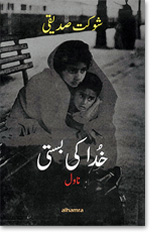Shams Ur Rehman Alavi
It took me sometime before I could buy Raza Rumi's 'Delhi by Heart'. But the moment I got it, I just couldn't put it down.
I read the entire book within a day. Apart from the fact that it is a fascinating travelogue, the book also takes you to a journey into Delhi's rich past.
The book is also Raza's search for his own roots*, as you will get to know after reading it. Delhi is one of the oldest capital cities in the world, which has been the seat of Indo-Islamic civilsation for a millennium.
It was from here that the mighty Mughals ruled and before them there were Slave, Lodhi, Khilji, Tughlaq and Syed dynasties.
The city was plundered by Abdali, the likes of Nadir Shah and later by British soldiers in the aftermath of the first was for independence in 1857.
In 1947, it bore the brunt of partition. Ravaged, it always rose from the dust again [and again] to become a city, more bustling than it was in the past. Raza takes us though the history of this great city. Along side him, the reader becomes a fellow traveller.
The era of Sufi saint Nizamuddin Auliya and his disciple Amir Khusro, the queen Razia Sultana who ruled India from here, Jehan Ara who planned Chandni Chowk, the emperor of poetry Mirza Ghalib who lived and died in this City, and to modern era.
One of the first books on Delhi, which I read was Khushwant Singh's 'Delhi'. Later, I read William Dalrymple's City of Djinns and Sam Miller's 'Delhi: Adventures in a Mega City'. Delhi fascinates us also but there is a difference.
The Writer from Pakistan
An 'outsider' always manages to spot things which we often ignore about our cities. We may not realise, how certain things that appear mundane to us, will strike a person coming from a foreign country, especially, Pakistan.
With his deep interest in art, architecture, music, heritage, history, Hindu-Muslim composite culture and Urdu poetry, Raza Rumi gives us a complete portrait of the glorious and continuous civilisation that is known as Delhi. Clearly, he is well equipped to deal with Delhi.
 |
| Raza Rumi |
From Amrita Preetam to Gulzar, his views on the left-liberal citadel 'JNU', the visit to the Jamia Millia Islamia, Raza Rumi touches the world of contemporary politics and literature. He is quite aware of Indian politics.
The author is lucky that during his several visits to Indian's capital, he was able to meet his favourite fiction writer--the legendary Urdu litterateur Qurratul-Ain-Hyder.
Raza also writes about his interaction with Delhiites like Khushwant Singh and Sadia Dehlvi. In between, he tells interesting tales, attends a mehfil at a khanqah or bumps into a Punjabi man whose family members were killed in Partition. So what happens thereafter!
The real life story of a bubbly Muslim girl whom Raza had met during his earlier trip and whose fate takes a strange turn. Raza also writes about Dehlvi dedicacies and the street food in Delhi. Sarmad to Saffronisation, Dara Shikoh to Dalits, he touches a lot in the nearly 325 page book.
The author has provided translation of Urdu-Punjabi poetry, couplets, Sufi and Bhakti songs, in the book. From Indraprastha to Mughals, Lutyen's and thereafter, modern India's capital in 21st century, it's a long leap by any standards. Still, its enchanting and light to read.
The verdict is clear. Raza Rumi has written the book with his heart. Going by the author's perception, his humanism, broad understanding of the shared heritage of the people of the sub-continent and its future, one surely expects more from him in coming years.
Hope, his literary journey continues. Regions like Doab [Awadh] and Deccan await him now.
[*centuries ago one of his ancestors on his way to Benares had converted to Islam]
Raza Rumi blogs at Razarumi.com






































